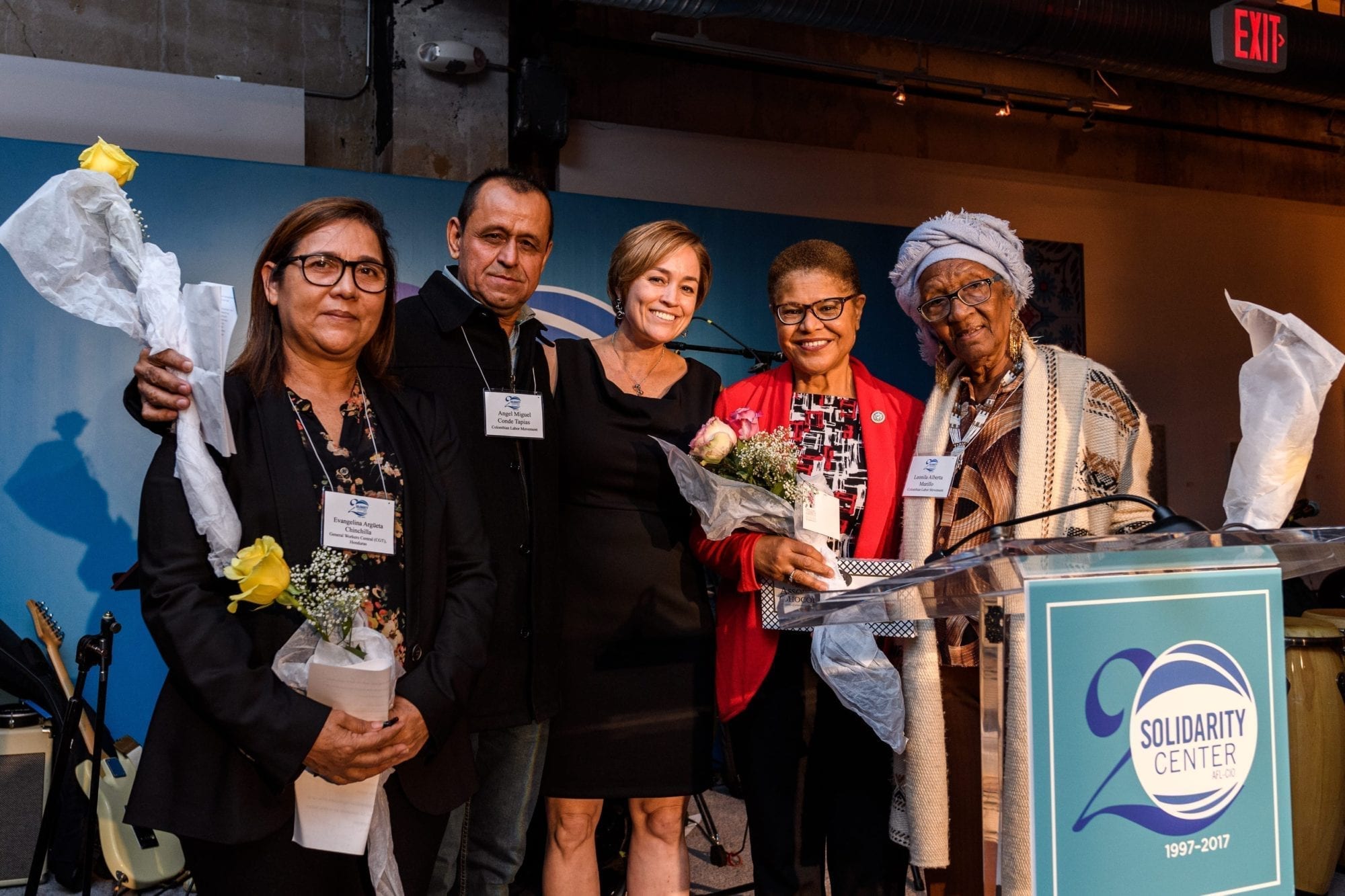
Nov 16, 2017
Some 300 allies, coalition partners and sponsors of the Solidarity Center packed the Longview Gallery in Washington, D.C., last night to celebrate the organization’s 20th anniversary. The day began with a book launch and discussion on informal workers and collective action.

AFL-CIO Secretary-Treasurer Liz Shuler joins Rep. Sander Levin at the Solidarity Center’s 20th Anniversary Celebration. Credit: Solidarity Center/Imagine Photography
“The energy in the room is fabulous and I couldn’t be prouder to be a part of this important occasion,” said AFL-CIO Secretary-Treasurer Liz Shuler, who hosted the evening’s program.
“The work of the Solidarity Center is critical to unions around the world and also so important to our American labor movement,” she said. “The Solidarity Center reaches half a million workers a year with programs that expand access to justice, and boost organizing and advocacy skills for workers, unions and their allies. And we need to join together across borders, now more than ever, to make sure we are raising standards for all workers everywhere.”
Honored guests included members of the Colombian and Honduran labor movements, and U.S. Sen. Sherrod Brown, who could not attend because of a last-minute vote in Congress. In a statement read at the event, Brown said:
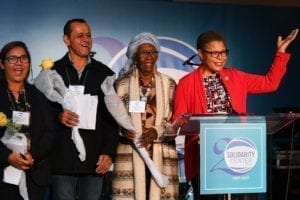
Rep. Karen Bass (right) celebrates Solidarity Center honorees Eva Argueta, Miguel Conde, and Leonila Murillo. Credit: Solidarity Center/Imagine Photography
“In 2016 alone, the Solidarity Center supported Tunisian government worker’s fight to get raises. You helped to add nearly 1,000 new members to the El Salvador sugar cane union. And through your efforts, nearly 7,000 workers became union members in Myanmar. And that’s just in the past year. Over two decades you helped so many workers get dignity and better lives.”
Rep. Karen Bass, who introduced the honored guests, has worked with the Solidarity Center in her role as Ranking Member of the Subcommittee on Africa, Global Health, Global Human Rights and International Organizations of the House Committee on Foreign Affairs, where she brings a powerful voice to democracy, human rights and governance on the African continent and beyond.
Before introducing the honored guests, Bass noted that she had “seen firsthand how the Solidarity Center’s projects around the world strengthens workers’ voices and enables working people to defend their civil rights to build stronger and more responsive democracies.”
Colombian, Honduran Union Movements Honored
Angel Miguel Conde Tapia, a Colombian palm oil worker and union leader who accepted the Solidarity Center honor on behalf of the Colombian trade union movement, described how he and his co-workers struggled for years to form a union and win bargaining rights.
“Every advance has to be won by organizing, protests and legal actions,” he said, “and always while confronting threats and violence.” Twelve labor activists were assassinated as they sought to form unions, and Conde nearly lost his life when a gunman’s weapon failed to fire at him.
Evangelina Argüeta Chinchilla, who has been instrumental in helping Honduran garment workers form unions and win contracts, accepted the honor on behalf of garment workers and their unions, which are negotiating eight landmark collective bargaining agreements covering 21,000 garment workers.
“To employers and the government, we made it clear that the workers, especially those from the garment and textile industry, were not playing,” she said. “The workers have less fear in organizing. Our organizing growth speaks for itself.”
From Colombia, Leonila Murillo accepted the honor for the Buenaventura community, where Afro-Colombians took to the streets for 22 days in May demanding peace and dignity after years of neglect by the national government. Many of the port city’s 400,000 predominately Afro-Colombian inhabitants live in abject poverty without access to proper hospitals, schools, roads and other basic services. On June 6, the government agreed to invest more than $500 million in the long-neglected city over the next decade.
20 Years in Forefront of the Global Fight for Workers’ Rights
Earlier in the evening, U.S. Rep. Sander Levin joined participants, and described his experience talking with Bangladesh garment workers who told him they were forced to work in the unsafe Rana Plaza building or lose their jobs. The building collapsed the next day, killing more than 1,100 workers and injuring thousands more.
U.S. Rep. James McGovern, who was unable to attend, sent remarks in which he said he applauds and admires everyone at Solidarity Center “who, day in and day out, provide these workers with support, technical and legal assistance, and who are often the only people getting the word out about these workers’ struggles.” Read his full statement here and see greetings from unions around the world here.
Closing the evening program, Solidarity Center Executive Director Shawna Bader-Blau thanked her “powerfully inspiring sisters and brothers Leonila, Conde and Eva” and applauded the work of the AFL-CIO International Department and Solidarity Center staff.
“We’ve seen successes, but we’re not there yet,” said Bader-Blau. “Until farmworkers and garment workers, retail and construction, domestic workers and heroes of our health and education sectors and all workers can be certain they will receive fair wages, a voice in their democracies, work in safe environments and never have to fear a sexual assault on the job, the Solidarity Center will be there.
“But here’s what we know. It takes more than skills, more than a commitment to a struggle and a willingness to fight. It takes joy. It takes love. It takes conviction, and it takes power.
“And when I stand here in this room with all of you, all of US together—I feel the unstoppable, beautiful power of solidarity.”
The Solidarity Center thanks the many sponsors of the event.
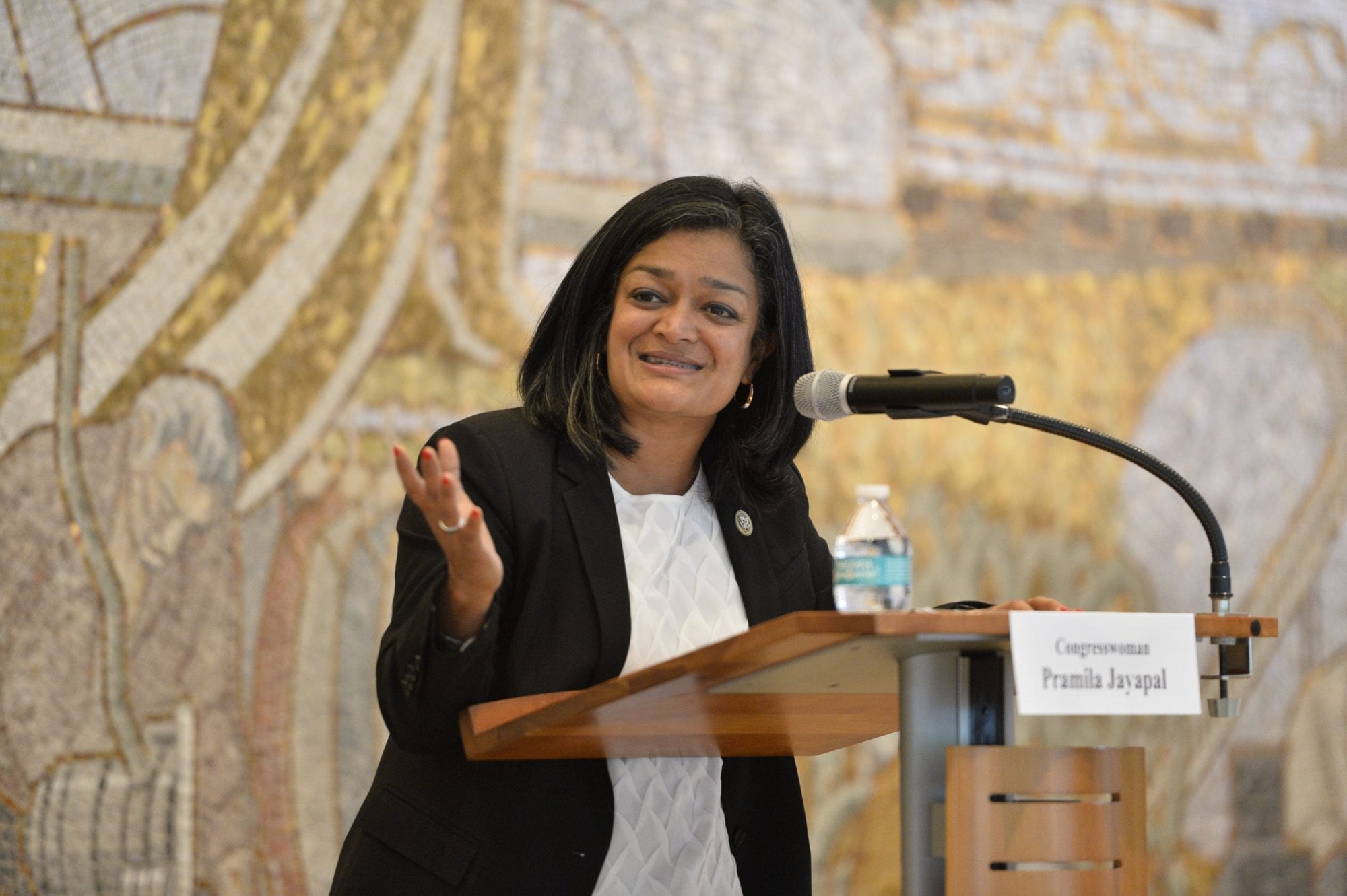
Nov 15, 2017
“Informal workers are organizing and they will organize as long as there is injustice and oppression,” says Sue Schurman, distinguished professor of Labor Studies and Employment Relations at Rutgers University.
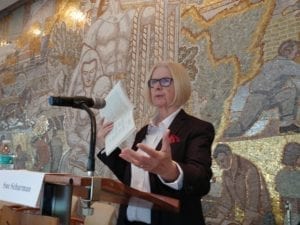
Sue Schurman, distinguished professor of Labor Studies and Employment Relations at Rutgers University, opened the Solidarity Center book launch. Credit: Solidarity Center/Tula Connell
Opening a Solidarity Center book launch and panel discussions on Informal Workers and Collective Action: A Global Perspective this morning, Schurman also cautioned that unless unions focus on the issues unique to empowering workers who have no direct employer, workers in the informal economy will organize to improve their rights “with or without the existing trade union movement.”
Hosted by the AFL-CIO, the event launched the Solidarity Center daylong 20th Anniversary Celebration in Washington, D.C., which will culminate tonight with a festive event honoring U.S. Sen. Sherrod Brown and the Colombian and Honduran labor movements. Rep. Karen Bass and AFL-CIO Secretary-Treasurer Liz Shuler will host.
Edited by Schurman, Adrienne E. Eaton and Martha A. Chen, Informal Workers collects case studies from union campaigns in such countries as Brazil, Cambodia and Colombia, bringing together in one volume a compendium of academic field research and concrete grassroots examples. The book was produced by Rutgers and WIEGO with support from the Solidarity Center.
Highlighting the event, U.S. Rep. Pramila Jayapal, the first Indian-American woman in Congress, energized participants with an impassioned call to action.
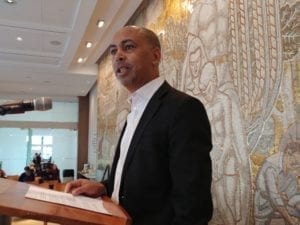
AFL-CIO Executive Vice President Tefere Gebre opened the Solidarity Center book launch on informal workers. Credit: Solidarity Center/Tula Connell
“This is about people standing up around the world and making it clear we have a very different vision,” she says. “It is about more jobs and better jobs for workers all over the world and that is the work of the Solidarity Center that we are grateful for.
“You are the ones who give me hope, working in countries around the globe in countries where organizing unions is sometimes life and death.”
“The work of the Solidarity Center around the world is very personal,” says AFL-CIO Executive Vice President Tefere Gebre, who addressed the opening session. “I was a refugee and dedicated my life to workers all across this country and world in support of their fights.”
A Broader, More Inclusive Labor Movement
Building a broader and inclusive labor movement by recognizing workers’ intersectionality is essential for unions to organize going forward, according to panelists.
“We can’t organize on the basis of class, or ethnicity, or gender—we must think about multiple identities,” says Janice Fine, associate professor of Labor Studies and Employment Relations, at Rutgers University.
Fine spoke on “Perspectives on Fighting for Social and Economic Justice for All,” the first of three panels.
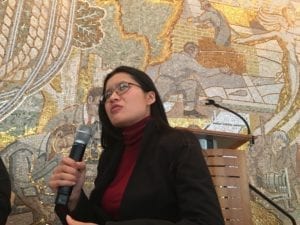
Mary Evans from Rutgers discussed how female Cambodia beer sellers improved their status as women in their communities by joining together to better their workplaces. Credit: Solidarity Center/Tula Connell
In Cambodia, where women beer sellers launched a grassroots social justice movement to improve their working conditions, and ultimately joined with unions, women have made tremendous progress in improving their status at work and in their communities, says Mary Evans, Labor Studies professor at Rutgers University.
“Beer worker women wanted dignity at work. There have been huge strides for women in Cambodia” where women have little status, she says.
Speaking about the need for unions to engage in “intersectional” organizing—inclusive, cross identity movement building, AFL-CIO International Director Cathy Feingold says, “ We need to build a campaign from the roots up, not at the place where we get stuck.
“Solidarity is multi-dimensional and horizontal,” she says. “We have to be saying, ‘I look you in the eye,’ not ‘I look down on you.’ ”
Speaking on the second panel, “The Impacts of Successful Organizing on Communities, Societies and Countries,” Evangelina Argüeta Chinchilla, National Coordinator at the General Workers Central (CGT) union confederation, described some of the challenges in organizing garment workers and negotiating bargaining agreements.
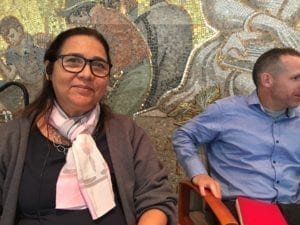
“Trade unions have been critical to the fight we are in”—Evangelina Argüeta Chinchilla, national coordinator at the General Workers Central (CGT) union confederation Credit: Solidarity Center/Tula Connell
“Trade unions have been critical to this fight we are in,” she says. “We have really been intentional about the unions being on the sideline in this struggle … and stand up to government and corporations and be the voice for the workers in this industry.” But the unions have not worked alone, she says. By partnering with women’s advocacy groups and anti-violence networks, unions have broadened their knowledge and expanded their allies in Honduras and around the world.
Argüeta and several Honduran garment workers will accept the honor award on behalf of the Honduran union movement at tonight’s 20th Anniversary Celebration.
Social Movement Unionism
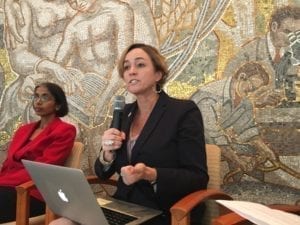
Solidarity Center Executive Director Shawna Bader-Blau described how Tunisian unions joined a countrywide movement for social justice. Credit: Solidarity Center/Tula Connel
Highlighting the Tunisian labor movement’s role in the 2011 Arab spring, Solidarity Center Executive Director Shawna Bader-Blau said unions initially played a supporting role to the grassroots opposition to dictator Zine El Abidine Ben Ali.
Later, the labor movement made a choice to shift its political support to the people, and by calling a national strike in which 100,000 union members took to the streets, the union movement facilitated the election of a democratic government.
“What the labor movement did was recognize itself in this movement. Bread, freedom and liberty—that’s what the labor movement is about.”
In Buenaventura, Colombia, where port workers were paid low wages with no social protections after their jobs were subcontracted, workers went on strike despite a law prohibiting them from doing so because they were not formally employed, says Dan Hawkins, research director at the Escuela Nacional Sindical in Colombia.
The strike, says Hawkins, empowered the Afro-Colombian community because “it symbolized to people in a racially discriminated city where all people in power are white or mestizo, the importance of port workers standing up for their rights.”
In the Dominican Republic, where informal economy workers have no legal right to form unions, domestic workers joined together in an association to work for their rights, says Fine, who shared the results of her case study from Informal Workers. The efforts of the primarily Haitian women workers were key to moving 2011 passage of International Labor Organization Convention 189 on domestic worker rights, expanding the possibility of decent work to domestic workers around the world.
Summing up the conference discussion, Jayapal says, “Ultimately we need to recognize we need to help workers around the world. We need to take on racism and sexism and xenophobia because that’s what will make the union movement strong.”
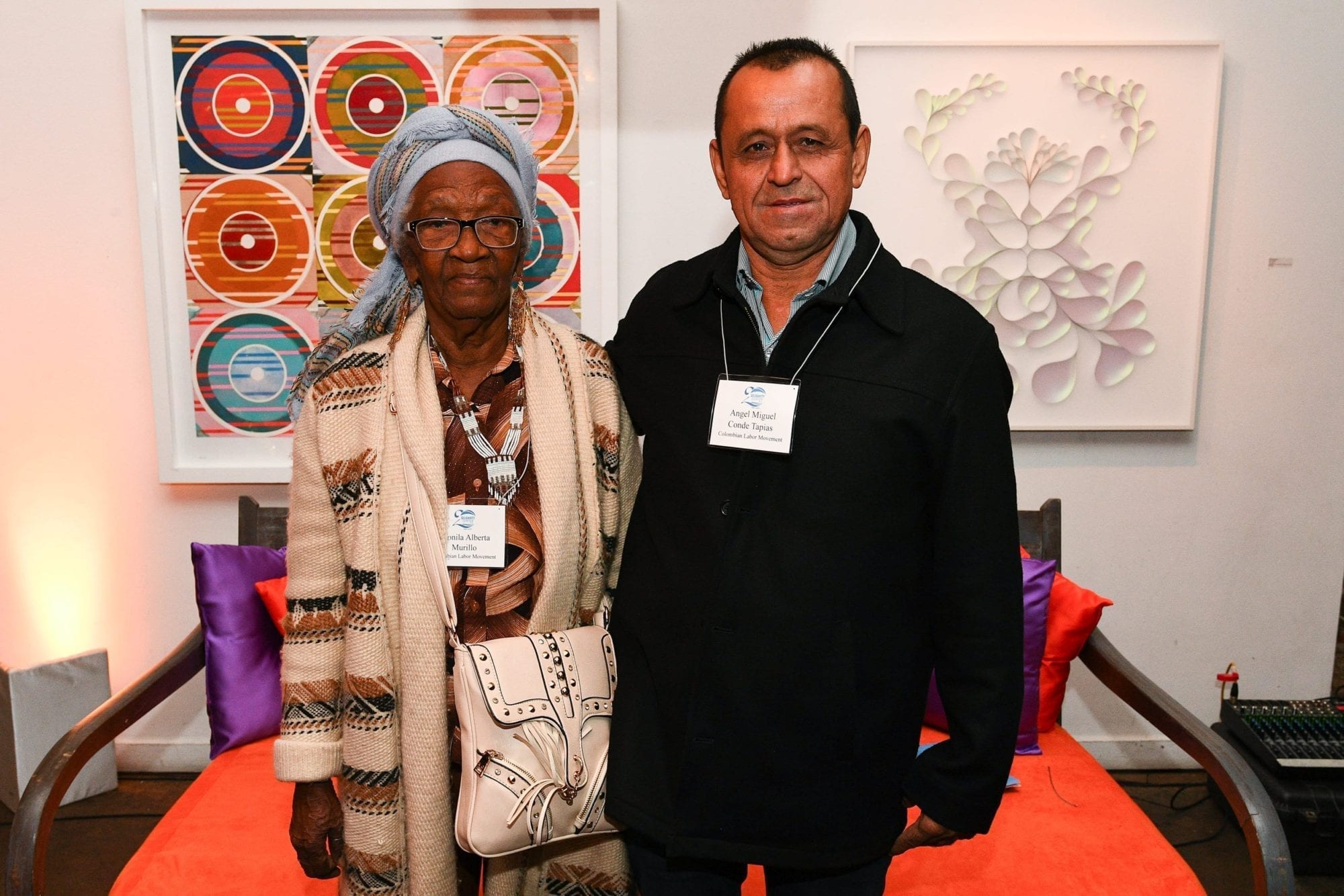
Nov 14, 2017
Leonila Murillo, a decades-long leader in Buenaventura, Colombia, and Angel Miguel Conde Tapia, a Colombian palm oil worker and union vice president are among the extraordinary leaders and activists who will be honored for their dedication to improving the lives of workers and their communities during the Solidarity Center 20th Anniversary celebration in Washington, D.C., tomorrow.
The evening event features AFL-CIO Secretary-Treasurer Liz Shuler and also will honor U.S. Sen. Sherrod Brown for his leadership to protect worker rights, and the Honduran labor movement for its dedication to achieving rights for workers in difficult and sometimes deadly conditions. Special guest U.S. Rep. Karen Bass will deliver remarks. (There’s still time to sponsor the event or buy tickets to attend!)
The day begins with a launch of the Solidarity Center-supported book, Informal Workers and Collective Action: A Global Perspective, and panel discussions featuring U.S. Rep. Pramila Jayapal and international worker rights activists. (Find out more about the free book event and RSVP here.)
On the Frontlines of Social Justice Unionism
Murillo, 81, has long been on frontlines to achieve social justice in her community. Most recently the mother of six children, 13 grandchildren and 14 great-grandchildren was among tens of thousands of peaceful protesters in Buenaventura who took to the streets for 22 days in May demanding peace and dignity after years of neglect by leaders in Bogota, the capital. Many of the port city’s 400,000 predominately Afro-Colombian inhabitants live in abject poverty without access to proper hospitals, schools, roads and other basic services.
On June 6, the government agreed to invest more than $500 million in the long-neglected city over the next decade. Buenaventura’s thriving port accounts for 60 percent of the country’s maritime trade and in 2014, generated $2 billion in tax revenue. Only 3 percent of that revenue is reinvested in the city, where residents are primarily Afro-Colombians.
Murillo, who leads 1,000 women in the organization Women in Black of the Pacific Route, and served as president of her neighborhood district’s Council of Community Action, also has worked for 29 years as a child caregiver, known as “community mother.” She was among leaders of the struggle by community mothers to gain pension benefits, going on strike in 2013 and winning promises from the government to give the women, who work as “independent contractors” the same benefits as directly employed caregivers. So far, the community mothers have seen no pension benefits.
“That’s why I’m here [in the United States]—to denounce that, to say that there are women who are dying and never getting their pensions,” Murillo says, speaking through a translator.
Palm Oil Workers Stand Strong in Face of Danger
As a palm oil worker in Colombia, Conde Tapia, hacks through the fruit with a machete, cleans branches and performs field maintenance on one of the country’s large agricultural plantations. A 29-year union member and now vice president of the palm oil union SINTRAINAGRO, he has sacrificed much to improve working conditions. Conde Tapia says he nearly lost his life when a gunman targeted him for his union work. Luckily, the gun pointed at him did not fire. But Conde Tapia has sent some of his children out of the area for their safety. Other union activists have had similar experiences.
Like the Buenaventura community, where workers say unfair job subcontracting is taking away family sustaining wages and social protections, palm oil workers in Colombia are regularly hired as subcontractors, enabling employers to avoid paying living wages and benefits granted in union contracts. In 2011, 15,000 subcontracted palm oil workers went on strike, and union leaders from four palm companies successfully initiated a process by which workers would gain formal employment status—success that vastly increased union affiliation.
In recognizing the incredible sacrifices of Murillo and Conde Tapia, the Solidarity Center honors the struggles of all Colombians in Buenaventura and across palm oil plantations who strive to improve their lives and their families’ future.
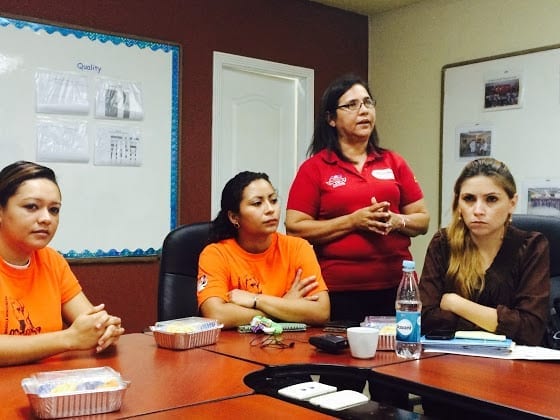
Nov 9, 2017
In Honduras, union leaders are on their way to successfully negotiating eight collective bargaining agreements covering 21,000 garment workers who have joined unions in the past few years. Contracts negotiated so far include 23 percent wage increases, free transportation to and from work, free lunch, additional severance pay for workers recovering from ergonomic-related illnesses, and educational funds for workers and their children.
Five of those agreements will be first-ever pacts for 17,350 workers, says Evangelina Argüeta Chinchilla, coordinator of organizing maquila workers in the northern Choloma region for the General Workers Central (CGT) union confederation.
Argüeta Chinchilla, whose efforts to improve factory workplaces and whose training among women garment workers is enabling them to take leading roles in their unions and communities, will be honored along with the Honduran union movement November 15 at the Solidarity Center 20th Anniversary celebration in Washington, D.C.
The evening event features AFL-CIO Secretary-Treasurer Liz Shuler and also will honor U.S. Sen. Sherrod Brown for his leadership to protect worker rights and the brave Colombian union and community activists for their frontline-efforts to achieve social justice in their country. And special guest U.S. Rep. Karen Bass will deliver remarks. (There’s still time to sponsor the event or buy tickets to attend!)
The day begins with a launch of the Solidarity Center-support book, Informal Workers and Collective Action: A Global Perspective, and panel discussions featuring U.S. Rep. Pramila Jayapal and international worker rights activists. (Find out more about the free book event and RSVP here.)
Honduran Unions ‘Persevere on Behalf of Workers and Their Families’
In a country where in recent years union leaders have been harassed, attacked and even murdered, and where employers utilize hardball tactics to prevent workers from forming unions and bargaining contracts, the stunning success of the garment workers in achieving fundamental workplace rights is a “testament to the determination of the Honduran union movement to persevere on behalf of workers and their families,” says Solidarity Center Executive Director Shawna Bader-Blau. “Together, they are helping to ensure that workers have living wages, just and fair workplaces and the opportunity to improve the future of their children.”
Argüeta Chinchilla is emblematic of these dedicated activists. She began work in a maquila at age 15, where she toiled for nine years and was a founder of the union at her factory before becoming a full-time organizer for the CGT. With Argueta’s leadership, Honduran garment-sector unions have negotiated historic worker rights agreements with two major U.S. clothing brands, Fruit of the Loom (2009) and Nike (2010), that laid the groundwork for successive organizing and collective bargaining achievements.
She and other women unionists hold leadership trainings with assistance from women’s rights organizations and the Solidarity Center. Argüeta Chinchilla hopes to see women “exercising power proportional to the numbers we represent in the world, in the labor movement.”
Empowered women now ensure their concerns are reflected in bargaining agreements. Some of the contracts garment workers have negotiated so far grant women who have just given birth additional paid leave beyond the 12-week maternity leave they receive under Honduran law.
“This is important, because a lot of times women workers must resign because they don’t have anyone to take care of their baby, especially in the early weeks, and this will help them get through that period,” says Argüeta Chinchilla, speaking through a translator.
Expanding Democracy Through the Freedom to Form Unions
International solidarity with Honduran workers has been key to furthering their efforts to achieve decent jobs. In November 2009, Russell Athletic agreed to rehire 1,200 workers in Honduras who lost their jobs when the company closed the factory in an attempt to bust the union, after the union—with support from the Solidarity Center and the United Students Against Sweatshops—convinced 110 U.S. universities to cut their apparel contracts with Russell.
Since then, says Argüeta Chinchilla, “it is very evident that significant protections have been made—workers are more educated about their rights, there is more respect for freedom of association and collective bargaining, and improvements such as health and safety for workers.
“There is always the fear of losing your job, but less now than what happened in past.”
Earlier this year, a four-year campaign by Honduran labor unions to improve workplaces and strengthen the rights of workers culminated with the Honduran National Congress approving a new labor inspection law. The law promotes, monitors and is designed to ensure that workplace standards, safety and health provisions, and social security requirements are upheld. It includes financial penalties for violations of worker rights, including the right to form unions.
Argüeta Chinchilla knows that such success begins through empowering workers, especially women workers, to take active roles in their unions.
“The internal democracy of unions has improved,” says Argüeta Chinchilla. “Many more women are active in union leadership, and this has translated into civil society: Workers are more participative in democracy and government and the country in general.”
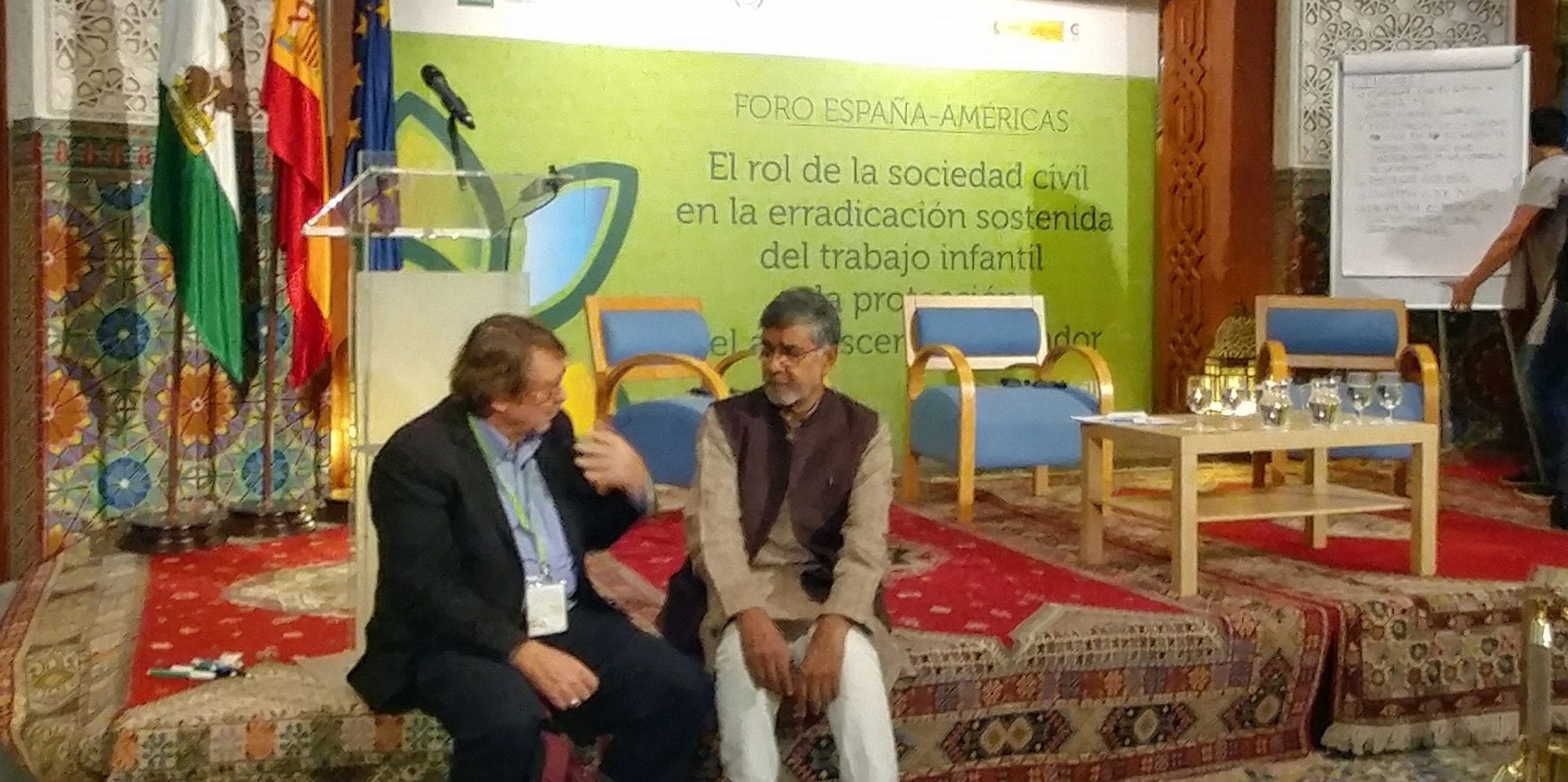
Nov 8, 2017
“Trade unions and NGOs must work together” to end child labor, asserted Nobel Prize winner Kailash Satyarthi as he summed up a two-day gathering of more than 40 child labor activist organizations from around the world in Seville, Spain. Participants at “Forum Spain-Americas: Civil Society for the Sustained Elimination of Child Labor” met last week to discuss United Nations Sustainable Development Goal 8.7, which aims in part at the eradication of child labor.
Satyarthi, founder of the Global March Against Child Labor, a worldwide network of trade unions, civil society organizations and education associations working to end child labor, launched the organization 20 years ago to press for adoption of International Labor Organization (ILO) Convention 138 on eliminating the worst forms of child labor.
“The Global March started out as a movement, which became an organization,” said Solidarity Center Asia Region Director Tim Ryan. “You can identify an issue and create an organization, but you need a vision to create a movement.” Ryan, who serves as chairperson of the Global March Against Child Labor, participated in a panel examining how the Global March’s international work over the years could inform renewed efforts to address child labor in the Western hemisphere.
Ending Child Labor, Ensuring Children Receive Quality Education
The connection of trade unions and civil society organizations in a close partnership has been a unique and important aspect from the inception of Global March, Ryan said. Currently, representatives from Education International, the global union federation of teachers, and trade union activists from Ghana and the United States are Global March Board members.
“It’s no surprise teachers’ unions around the world are part of the Global March,” Ryan said. “A key value underpinning the elimination of child labor has to be the opportunity for children to have a quality education.”
Satyarthi said that education philosophy around the world must be aimed at something greater than turning out consumers.
“Education that just produces makers and lubricators of the global economy is a disaster,” he said. But “there is no dearth of good people and good work who can strengthen our alliances with hope and resolve” to eliminate child labor with committed people and their organizations working for it.
The meeting, a joint initiative of the Spanish Andalusian Agency for International Development and the ILO to work together on strategies to eliminate child labor, sets the stage for the ILO Global Conference on the Sustained Eradication of Child Labor meeting this week in Argentina.













